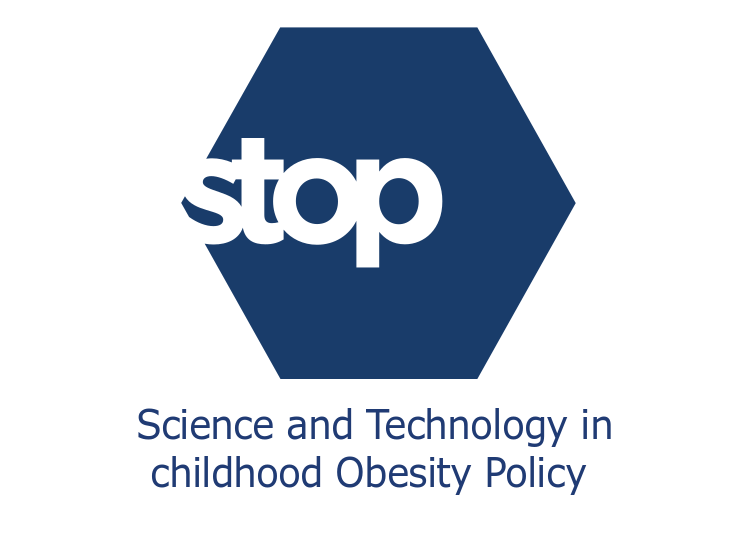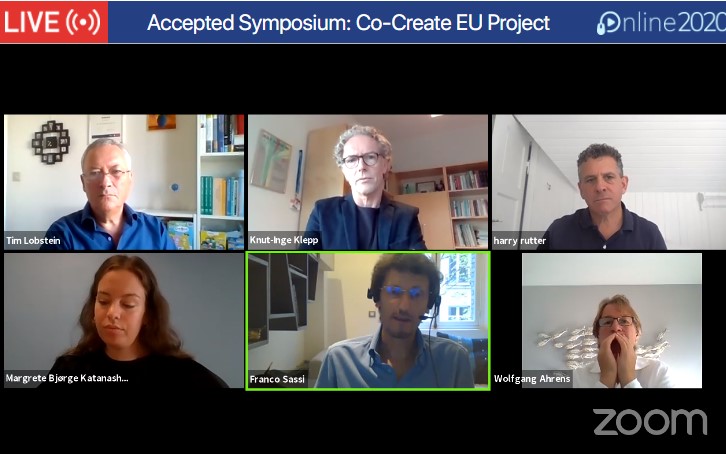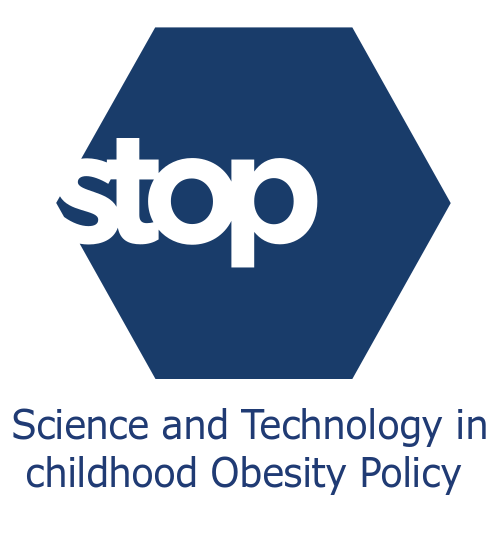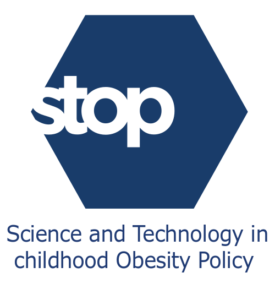On September 2nd, 2020, EU-projects CO-CREATE, STOP and PEN met at ECO/ICO 2020 for a joint symposium where they discussed how the three projects are trying to address some unresolved challenges around childhood obesity and ensure successful, sustainable outcomes.
Globally, the prevalence of overweight and obesity is increasing: in 2016, it was estimated that 340 million school-age children were living with overweight. In-light of the urgency of the situation, the World Health Assembly established a global target of “no increase in the prevalence of obesity by 2025” [based on 2010 base levels]. However, as flagged by Professor Tim Lobstein, we are far away from achieving these: very few countries are showing better than a fifty-fifty change of meeting the target. In fact, the majority will fail. In Europe, current trends indicate that there will be over 10m children in the region affected by obesity in 2030, highlighting a significant failure to meet the target.
As our current attempts to curb the spread of the childhood obesity epidemic have failed, we now need to move towards implementing comprehensive policies addressing the environments surrounding us. Our joint symposium with three European projects – STOP, PEN and CO-CREATE – aimed to explore how we can address some of these unresolved challenges, while ensuring sustainable outcomes beyond the projects’ duration. These projects are framed around three pillars to bring new, innovative approaches to current childhood and adolescent obesity-related interventions: (i) evidence-based policies, (ii) accountability and (iii) youth engagement.
Three projects with distinct yet complementary approaches

The STOP project – a knowledge generation and translation approach
The Science and Technology in childhood Obesity Policy (STOP) project aims at expanding and consolidating the multi-disciplinary evidence base upon which effective and sustainable policies can be built to prevent and manage childhood obesity. Through a more traditional approach, the project aims to produce evidence that is relevant for policymakers and help them address the problem of childhood obesity. Specifically, the project focuses on the core idea that obesity has multiple and diverse characterisations, and therefore that one-size-fits-all policy approaches to childhood obesity are bound to fail, and the scientific component of the project is designed to recognise diversity and support the development of tailored solutions.
The PEN project – a policy-focused approach

The Policy Evaluation Network’s (PEN) vision is to provide Europe with tools to identify, evaluate and benchmark policies designed to directly or indirectly address physical inactivity, unhealthy diets and sedentary behaviour while accounting for existing health inequalities. Over the course of the project, PEN will aim to deliver an overview of the ‘best’ public policies most likely to sustainably support more favourable health behaviours. PEN aims to assess public policies with potential influence on food and physical activity environments; foster a pan-European monitoring and surveillance system; model the impact of policies at the population level; evaluate policy implementation processes and their facilitators and barriers; and give recommendations for an equity and diversity perspective in policies directly or indirectly targeting dietary, physical activity or sedentary behaviours across Europe.
 CO-CREATE – an experimental approach
CO-CREATE – an experimental approach
Through a more experimental approach, CO-CREATE aims to investigate how policy changes can support healthy eating and a physically active lifestyle with the aim of halting the rise of adolescent obesity. By focusing on upstream factors and context change instead of on individual behaviour change, CO-CREATE hopes to generate sustainable impacts that contribute to narrowing inequalities. The project provides a model for how to involve young people and the range of relevant stakeholders by explicitly politicising the issue of obesity, providing specific obesity related policy proposals, and designing and testing advocacy tools and strategies for implementation and evaluation.
During the symposium, Professor Harry Rutter highlighted that while all three projects have some overlap, they are also looking at different areas of the problem. We also know that obesity, and specifically childhood obesity, is now a public health emergency. So what are key things missing in our collective response to obesity with young people? Here’s what our panel had to say:
“What we are missing is an ability to understand the behaviours of those who are most in need to change behaviour. We haven’t been very successful in changing children’s behaviours because we don’t take their perspectives into account. The behaviours of children from low socio-economic backgrounds are the ones we understand the least, and the drivers of those behaviours are what we need to change if we want to make a significant difference in CHO.” Professor Franco Sassi, STOP PI
“There is still a lack of understanding that different policy dimensions have an impact on health and wellbeing. For instance, transport ministries often lack awareness of the health impacts of their policies. There is a lack of cross-talk between different ministries on local and national levels, as well as a lack of prioritisation of policies. We need to raise awareness of the health impact of different policies.” Professor Wolfgang Ahrens, PEN PI
“This is the kind of questions we were asking when designing the project. There still tends to be a stronger focus on individual-level based interventions, less so on population-based strategies and policies, and a lack of seeing a complete system and the relationship between all these policies. The voices of young people are also still largely missing.” Professor Knut-Inge Klepp, CO-CREATE PI
Engaging different actors in developing obesity-related policies: the role of young people
As current trends are showing, past interventions to address the growing challenge of childhood obesity have not been efficient and a new approach is urgently needed. If we want to have true and lasting effects to positively impact youth health, including overweight and obesity, we will not only need to include young people’s input, perspective and suggestions: the initiative and leadership of young people themselves should be part of the answer when facing societal challenges that impact them. Involvement and empowerment of adolescents fosters participatory processes of identifying and formulating relevant policies, and including them in the conversation is more urgent than ever.
“We need to talk to youth. We have a tendency to talk about youth, but rarely involve them in the topics we are discussing. Youths are experts of their own lives. It is important to find a balance where we let youth organise themselves individually and independently, and also involve them in existing adult structures.” Margrete Bjørge Katanasho, Project Manager at Press

***
Learn more about the projects
CO-CREATE:
The CO-CREATE Project has received funding from the European Union’s Horizon 2020 research and innovation programme under grant agreement No 774210
www.co-create.eu
Twitter: @EU_COCREATE
STOP:
The STOP Project has received funding from the European Union’s Horizon 2020 research and innovation programme under grant agreement No 774548
www.stopchildobesity.eu
Twitter: STOPobesityEU
PEN:
The PEN Project is funded by the Joint Programming Initiative “A Healthy Diet for a Healthy Life” (JPI HDHL), a research and innovation initiative of EU member states and associated countries.
www.jpi-pen.eu
Twitter: @PEN_EU1

